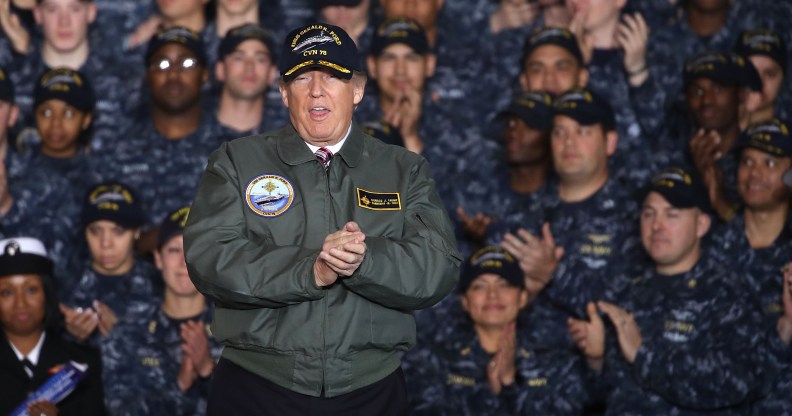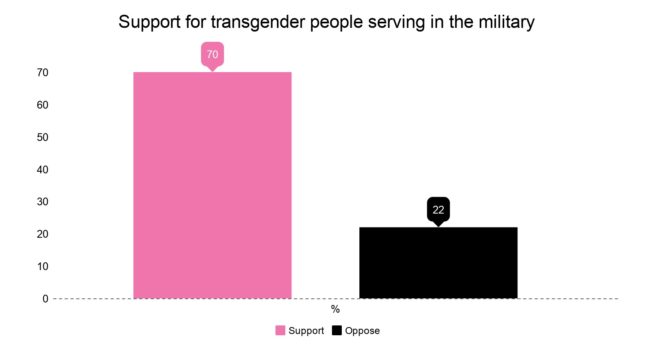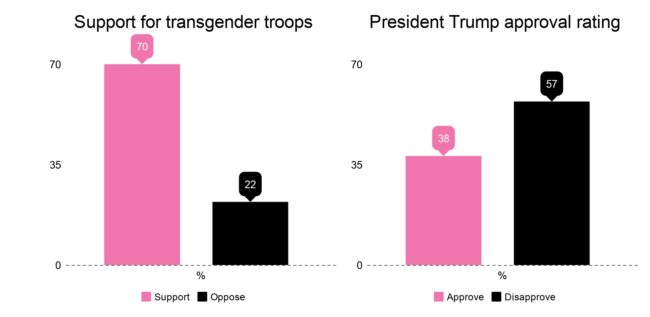Transgender troops have more support than Donald Trump

President Donald Trump speaks to members of the U.S. Navy and shipyard workers on board the USS Gerald R. Ford CVN 78 that is being built at Newport News shipbuilding, on March 2, 2017 in Newport News, Virginia. (Mark Wilson/Getty)
70 percent of Americans believe transgender people should be free to serve in the US military despite Donald Trump’s ban, according to a new poll.
The Quinnipac University poll published on Tuesday (January 29) revealed an overwhelming majority of people support the rights of trans troops, despite fears of an imminent purge.
The US Supreme Court agreed on January 22 that the Trump administration could proceed with its ban on transgender people in the armed forces, despite ongoing legal battles on the issue.
The Quinnipac poll underlines the fact that the trans troop ban is one of Donald Trump’s least popular policies, with 70 percent of voters saying they believe “transgender people should be allowed to serve in the military,” with just 22 percent opposed.

70 percent of voters support transgender people serving in the military
The figures suggest a collapse in the already-low support for Trump’s ban since the initial 2017 announcement, when 27 percent of people had opposed transgender military service.
Voters across every single demographic group said that trans troops should be free to serve, with the exception of Republicans, who oppose transgender military service by 50 percent to 40 percent.
94 percent of Democrats said that transgender people should be free to serve.
Ironically, support for transgender service is far higher than it is for Donald Trump’s Presidency.
According to the same Quinnipac poll, 57 percent of Americans disapprove of Trump’s job performance, and just 38 percent believe he is doing a good job.

Just 38 percent of voters think Donald Trump is doing a good job, but most Americans support trans troops
Ashley Broadway-Mack of the American Military Partner Association told the Washington Blade: “It’s crystal clear that the far majority of Americans reject Donald Trump’s reckless, discriminatory attack on our nation’s brave transgender service members.
“Instead of singling out transgender troops for discrimination, Donald Trump should reverse course and honor them for the heroes they are.
“Transgender service members have proven time and again that what matters is their ability to accomplish the mission — not their gender identity.”
GLAAD took to Twitter to highlight the survey, adding: “Did you see this, @realDonaldTrump??”
Donald Trump military transgender ban ‘creates dangerous environment’
LGBT+ campaigners have already vowed to keep fighting for trans troops.
Peter Renn of Lambda Legal, a law firm representing transgender military personnel in the case, said on January 22: “The Supreme Court’s decisions today are perplexing to say the least…allowing the administration to begin to discriminate, at least for now, as the litigation plays out.
“For more than 30 months, transgender troops have been serving our country openly with valor and distinction, but now the rug has been ripped out from under them, once again. We will redouble our efforts to send this discriminatory ban to the trash heap of history where it belongs.”
OutServe-SLDN Executive Director Andy Blevins said: “For the past two-and-a-half years, thousands of qualified, transgender individuals have made our nation’s armed forces better, in every measurable quality, with their authentic service.
“The Supreme Court’s decision to allow the Trump-Pence Administration to institute their wanting and discriminatory practices while the litigation proceeds is disappointing — our siblings-in-arms deserve better.
“We look forward to continuing our representation of these proud and selfless patriots, and reminding this Administration that military policy cannot be defined by baseless and discriminatory rationalisations.”

